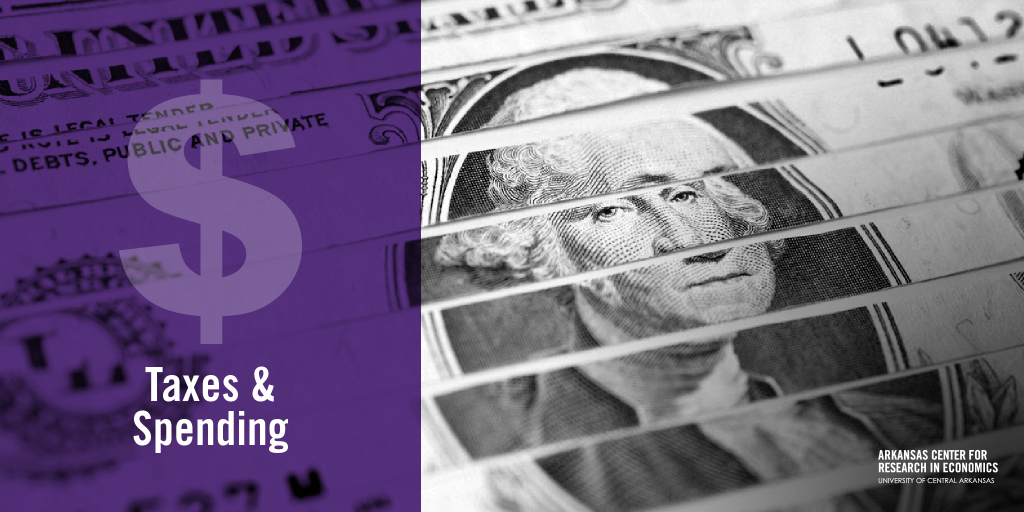By Caleb Taylor
Gov. Asa Hutchinson proposed biennial budget released last Tuesday contains an early Christmas present for new Arkansans, but does it make larger reforms more difficult?
Hutchinson announced on Nov. 10 that he’d like to cut the top individual income tax rate to 4.9 percent for new residents of the Natural State. He also mentioned his long-stated goal of cutting the top individual income tax rate for all Arkansans, but that’s not included in his budget.
This top rate is already scheduled to decrease from 6.6 percent to 5.9 percent on January 1, 2021 based on tax reform legislation passed during the 2019 legislative session.
In an interview with Jay Bir on Capitol View on KARK (budget segment begins at 9:20) on Sunday, Nov. 15, ACRE Scholar and UCA Assistant Professor of Economics Dr. Jeremy Horepdahl discussed Hutchinson’s proposed budget.
Horpedahl said:
The Governor has had a long term goal of getting the top tax rate on individual income down to 5 percent. I guess 4.9 percent is a little nicer… He’s now saying that he wants to do this in the next five years. Given the uncertain budget times, he is proceeding with caution. There isn’t actually a proposal in this budget to do that. It’s kind of a goal. A taste of that goal is that we’re going to do it for people that are moving here. People who are new residents are going to get that [4.9 percent rate] immediately in his proposal.”
Horpedahl estimated about 30,000 to 40,000 new residents annually would benefit from the tax cut, but the vast majority would’ve moved to Arkansas anyways. However, it’s possible the change could attract more to move.
Horpedahl said:
You can’t really distinguish between people who are moving to Arkansas anyway or people who are moving for the lower rate.”
Hutchinson’s proposed budget also increases the balance in the Long-Term Reserve from $185 million to $285 million by the end of the biennium. Arkansas’s Long-Term Reserve Fund balance ranks 45th in the nation totaling 2.7 percent of general fund expenditures, according to the Tax Foundation.
Horpedahl said:
That’s a very prudent thing to do especially since we’ve just seen a time where the budget got hit really hard. Now, we didn’t have to dip into it this time because it ended up being not as bad as they thought. It’s good to have that reserve there not only to protect the budget but also it helps your bond ratings so the state can borrow at lower rates. It shows you have the money to meet your obligations in case of an unexpected downturn.”
For more on Arkansas’s Long-Term Reserve Fund, check out ACRE Director and UCA Associate Professor of Economics Dr. David Mitchell’s blog post entitled “Why Arkansas’s Long-Term Reserve Fund May Not Weather the Next Rainy Day.” Mitchell and Dr. Dean Stansel’s paper entitled “State Fiscal Crises: Are Rapid Spending Increases to Blame?” published in the Cato Journal analyzes how government spending increases during economic expansions worsen state fiscal crises.
All of these policy proposals would have to be approved by the General Assembly in the upcoming 2021 legislative session in order to become law.
Horpedahl was also quoted in an article in the Nov. 16-22 issue of the Daily Record in Little Rock about tax changes in Hutchinson’s proposed budget.
Horpedahl said:
This tax reduction has been a long-standing goal of Gov. Hutchinson, and it should be feasible to do so once we are past the COVID recession. The governor’s immediate plan to reduce the rate only for new residents could have some benefits of attracting new workers, but it will also be unnecessarily costly, since it will likely have to be given to the roughly 30,000 new workers that move to Arkansas each year anyway, according to the latest IRS Statistics of Income Migration Data.”

